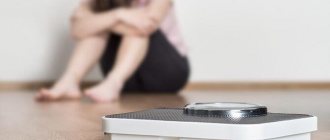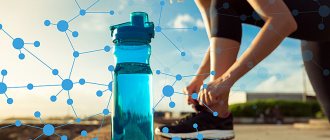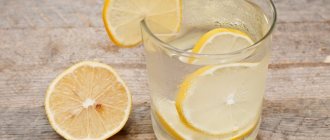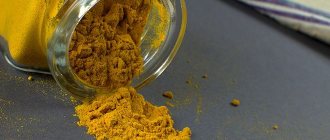More and more resources on healthy lifestyle, and not only them, write about the benefits of drinking water. Everyone today already knows that you need to drink at least 2 liters of water. Is this really true? Is this an advertising ploy to promote bottled water? Why drink water at all? How much water should you drink per day? What kind of water to drink? When to drink water? And does water consumption influence weight loss or weight gain?
According to Ayurveda, all diseases are caused by toxins. At the initial stage, they simply circulate in the blood, but under certain circumstances they are deposited inside the body. If this process continues long enough, a disease develops. Ayurveda talks about water as one of the best means for removing toxins from the blood.
Immediately after waking up, you need to drink 1-2, or preferably 2-3 glasses of water. The water should be at room temperature or lukewarm. You can add a little lemon juice. Cool water is not recommended because... it cools the internal organs and the circulatory system, which can subsequently disrupt their functioning. Water after waking up is the only water we drink during the day that we do not drink because we feel thirsty. Drinking water in the morning is necessary in order to start the process of cleansing the body of toxins that have accumulated overnight. At night, only we sleep, and our body continues to work.
Further, during the day it is recommended to drink water in small sips and small doses so that the body is replenished with water gradually, without unnecessary stress. We drink water 40 minutes before meals and 1 hour after meals. Drinking water before meals helps in weight loss. If you need to gain weight, then drink it after meals. It is recommended to drink the main amount of the daily dose before 18.00
What kind of water is best to drink?
You can drink water either boiled or passed through a filter. However, melt water will bring the greatest benefit to your body. To do this, you need to fill the container with water, but not completely. Place it in the freezer. Check after a while. Water should not be allowed to freeze completely. Only half of the accumulated volume should freeze. Useful water freezes first. All the remaining water is filled with not very useful chemical compounds. We take the half-frozen water out of the freezer, break through the crust of ice and drain the water we don’t need. Next, we leave the ice to melt - this will be useful melt water.
It is not recommended to drink distilled water, because... it flushes both harmful and beneficial substances from the body.
Water consumption standards. The norm of water consumption for an adult conditionally healthy person is considered to be 30 ml. per 1 kg of body weight. If there are diseases such as obesity, diabetes, arterial hypertension and some others, then water consumption is limited to two liters. The norm of water consumption for children is 50 ml per 1 kg of body weight.
Water is life. Water is the main component of humans and all living organisms. And yet, when consuming water, focus primarily on your feelings. Listen to your body and be healthy!
Author Ekaterina Menshikova
Training course “I write!”
Tags: health, I write
About the Author: Blogging the Life
Your comment Cancel reply
- Related Posts
- Morning Habits of a Successful Freelancer
- Course_all_but_I_stay.docx
- When everything happens...
« Previous entry
Beneficial properties of curcumin
Antioxidant that fights free radicals
Unstable atoms with open valence are constantly looking for a “pair”. By aggressively penetrating the cell structure, they contribute to the degeneration of cells into malignant ones. By destroying free radicals, antioxidants prevent the occurrence of cancerous tumors: it is no coincidence that according to research results, turmeric is listed as one of the means that helps fight cancer.
In particular, it is used for melanoma and its treatment with chemotherapy, since turmeric helps relieve symptoms after chemotherapy.
Natural antibiotic
Works as an anti-inflammatory agent, the effectiveness of which is comparable to pharmaceutical drugs. In eastern countries, even in the middle of the last century, many refused antibiotics and, in the old fashioned way, treated serious diseases with turmeric, including tuberculosis and pneumonia.
Wound healing agent
This property of turmeric was known in ancient times, when eastern warriors and hunters kept a bag of turmeric powder with them, which they sprinkled on open wounds. To this day, turmeric is used to treat external non-healing ulcers that are difficult to treat with other means.
A remedy for reducing the level of “bad” cholesterol in the blood and normalizing sugar levels
Regular consumption of turmeric (about 1/2 tsp per day) reduces cholesterol levels in the blood. In the prevention of diabetes, turmeric is used as a means of reducing cravings for sweets and slightly lowering blood sugar levels.
Helps normalize hormonal levels
This property of turmeric was discovered not so long ago. Studies have shown that regular consumption of turmeric maintains high levels of male and female sex hormones and helps maintain reproductive health into old age.
For men, turmeric helps improve sperm quality and increase libido: it is not without reason that before the night of love in India it is customary to eat meat dishes with curry seasoning.
- Normalizes blood pressure,
prevents the deposition of cholesterol plaques on the walls of blood vessels, preventing atherosclerosis.
- Helps regulate metabolism
and the work of the gastrointestinal tract, having carminative and choleretic effects.
- Purifies the blood
, increases the level of iron in the blood, which is useful for anemia, and has noticeable antiallergic properties.
- Insect bite repellent
, including poisonous ones: in the east, turmeric is still used to treat scorpion stings.
- Used to cleanse the body of toxins
(according to Ayurveda, turmeric is used in combination with barberry and gentian) and for effective weight loss (including in combination with ginger).
how to remove excess water from the body
There are many ways in which a person can quickly and naturally get rid of extra water weight.
1. Reduce sodium (salt) intake
The first and perhaps easiest step to losing water weight is to reduce your intake of salty foods, because eating too much salt too often can cause immediate water retention. It doesn’t matter whether you add it to your food when cooking or like various ready-made dishes that contain a lot of salt - sausages, sauces, etc.
Swelling is caused by the fact that the body needs to maintain a certain ratio of sodium and water for the normal functioning of organs and systems. Accordingly, when you receive too much salt from food, your body tries to “balance” the amount of salt with liquid volume. It is for this reason that after salty food we are so thirsty, and as a result, water retention in the body.
According to doctors, it is recommended that a person consume no more than 2,300 milligrams (mg) of sodium per day, but the average actual dose is more than 3,400 mg.
Therefore, be more attentive to the amount of so-called processed foods: cheese, sausages, frozen instant meals, canned food, ready-made sauces, all kinds of snacks - they hide up to 75% of the sodium we consume.
But natural products: vegetables, fruits, nuts, grains, on the contrary, contain little sodium. And some may even help lower sodium levels in the body, such as bananas, avocados, and leafy vegetables.
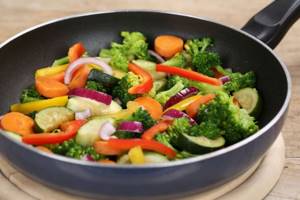
2. Drink more water
As suspicious as it may sound, drinking water can actually reduce your water weight. Dehydration causes the body to retain any additional water to rehydrate, while regularly drinking water in reasonable quantities will “calm” the body and normalize its functioning.
Water also improves kidney function, allowing them to more actively remove excess water and sodium.
Doctors recommend that adults drink 30-50 ml of clean water for every kilogram of weight. Sugary drinks (such as soda, juices, etc.) do not count; their consumption is generally best reduced to a minimum. 3. Reduce your carbohydrate intake
Carbohydrates also cause the body to retain additional water. When we consume them in food, the energy that we do not use immediately is stored in the form of glycogen molecules. Every gram (g) of glycogen holds 3 g of water, and this is the cause of fluid retention in the body.
Cutting back on the amount of carbohydrates you eat is a quick way to deplete your glycogen stores and therefore reduce your water weight. According to experts, an adult needs at least 130 grams of carbohydrates per day, but, as a rule, we consume them in larger quantities.
Some of the most common and frequently consumed carbohydrate foods include bread, rice, and pasta. Reducing carbohydrates and replacing their daily sources with protein foods (lean meat and fish, eggs, cottage cheese, soy) will help reduce water weight gain.
4. Increase physical activity
Physical activity provokes sweating, which also helps eliminate excess water. This is what leads to water weight loss immediately after exercise.
Exercise also stimulates circulation and improves blood flow, which can reduce fluid accumulation throughout the body, especially in the legs and feet.
Exercise also combats water weight by burning energy stores of glycogen. However, to avoid dehydration, it is vital to replenish your body's water reserves after any physical activity.

5. Take vitamins
Vitamin B6 and magnesium oxide can effectively combat fluid retention in the human body. These elements help the kidneys function by stimulating them to remove excess water and sodium.
Research shows that these substances are also very effective in relieving symptoms of premenstrual syndrome (PMS), including water retention.
Of course, before you start taking it, you need to consult a specialist, since their use in incorrect doses is fraught with side effects, and they themselves are not compatible with some medications.
6. Take diuretics from time to time
Diuretics help combat mild fluid retention. These drugs stimulate frequent urination, which helps the body get rid of excess water and sodium.
However, diuretic tablets, powders and teas are not recommended for long-term use. They should be used only as prescribed by a doctor, as their incorrect use can lead to dehydration or mineral deficiency.
| STEPANYANTS Arevik Armenovna Dermatovenerologist, cosmetologist Fighting swelling and normalizing the functioning of the lymphatic system is one of the components of a comprehensive program for losing weight and smoothing cellulite. There are quite a lot of predisposing factors to gynoid lipodystrophy (cellulite deposits - editor's note, hereinafter GL). But the initial stage of HL always begins with a circulatory disorder, which leads to damage to the capillaries and deterioration of microcirculation. As a result, the permeability of the capillary walls and the diffusion of plasma into the connective tissue increases - this is how edema appears. With pathology of the venous system, dystrophic changes can affect all tissues of the lower extremities. In this case, symptoms of incipient cellulite may include a feeling of “heavy legs” and swelling, especially in the evening hours. Unfortunately, this is a condition that can accompany both overweight patients and slender women. The most effective correction schemes (CS) are combined techniques. Typically, correction begins with intradermal administration of vascular and drainage components (artichoke, melito-rutin, silicon, ginkgo bilobo, buflomedil) and hardware lymphatic drainage. To work on the body, there are many more techniques that allow you to normalize the functioning of the lymphatic system. Some of my favorites are pressotherapy, cavitation and LPG massage. Course 6-8 times. But it is important to remember that in order to rid your body of the “orange peel”, there must be a system: limiting simple carbohydrates, adequate physical activity, and maintaining a drinking regime. |
What is useful in a home medicine cabinet?

- Used to disinfect infected burns and cuts;
- prevention of the development of Alzheimer's disease, multiple sclerosis, various types of tumors;
- has an antidepressant effect, improves mood and performance;
- used in complex anti-inflammatory therapy of arthritis, including rheumatoid;
- acts on lipid metabolism, helping to stabilize weight.
causes of fluid retention in the body
So, the main reasons for gaining water weight include:
Food
. A daily diet high in sodium and carbohydrates can lead to fluid retention. This is also fraught with a lack of potassium and magnesium.
Menstrual cycle
. Natural hormonal changes in a woman's body can cause water to accumulate about a week before her period. If during this period the lady eats a lot of salt and carbohydrates, the liquid will continue to flow.
Low level of physical activity
. Sitting or standing for long periods of time can impair the circulation of fluids throughout the body. This will cause water to accumulate in the tissues, which in turn will lead to swelling of the limbs.
Heart and kidney diseases
. They can interfere with blood circulation. This disruption will contribute to water gain, which will lead to swelling and excess water weight;
Medications
. Fluid retention is a side effect of many medications, including anti-inflammatory drugs and some oral contraceptives. If any medicine makes you concerned, you should consult your doctor.
To protect the liver and gastrointestinal tract
Turmeric normalizes the functioning of the digestive system, kidneys, liver and gall bladder. But it also has antiparasitic and antifungal functions, as a result of which humanity was freed from the presence of Giardia in the body - this is how curcumin entered the history of medicine as a remedy that improves intestinal microflora
Curcumin helps maintain normal liver function and detoxification, protecting the main “filter” from the effects of free radicals and toxins, and also prevents the formation of gallstones. Equally important, curcumin helps regenerate liver tissue by restoring hepatocytes.

The dietary supplement “Curcumin for the Liver” was created based on curcumin.
, which contains only natural ingredients - dandelion and burdock roots, milk thistle seed extract, turmeric root extract, artichoke extract, and black pepper extract - piperine, which enhances absorption and increases the bioavailability of all components.
Some important facts about “water weight”:
Water normally makes up 50 to 60 percent of an adult's total body weight.
“Water weight” refers to the extra fluid that accumulates in the body. Excess water causes bloating and swelling, especially in the abdomen, legs and arms. Differences in water levels in the body can cause a person's weight to fluctuate by as much as 1-2 kilograms throughout the day.
Long and severe water retention in the body can be a symptom of heart or kidney disease. Fortunately, most often this weight is a temporary phenomenon that resolves itself or with some minor efforts on your part, but cosmetic procedures can also help.
| STEPANYANTS Arevik Armenovna Dermatovenerologist, cosmetologist The predominant type of aging that aesthetic medicine doctors have to fight is the deformation-edematous type. Almost all patients, especially women of the middle age group, focus their attention on facial puffiness, pastiness, “bags” under the eyes, etc. There are special diagnostic tests that help practicing doctors understand whether it is possible to cope with the possibilities of therapeutic cosmetology or whether swelling is a consequence of some process, the correction of which is possible only with the help of plastic surgery. I would like to note that many drugs used to correct age-related changes are quite hydrophilic, i.e. are able to retain water, some of the drugs can aggravate swelling due to impaired lymph circulation. That is why patients with the edematous type need to prepare for further aesthetic corrections. And here preference should be given to hardware cosmetology, which helps in 4-6 procedures to normalize the functioning of the lymphatic system, improve the metabolic activity of cells, remove toxins, improve complexion and skin quality in general. There are many methods. In my practice, I use microcurrent lymphatic drainage (exposure to low frequency currents) and the LPG method, based on a vacuum-pinch effect on soft tissue. In addition, I believe that lymphatic drainage treatments are necessary for every woman living in a climate with high humidity. |
Benefits of Curcumin for Liver and Curcumin for Joints
Consist only of natural ingredients.
Enhanced with extracts to optimize the liver: Dandelion and Burdock roots, Milk Thistle seed extract, Turmeric root extract - Curcumin, Artichoke extract, Black Pepper extract - Piperine.
The regenerating effect is enhanced by extracts of Milk Thistle, Artichoke, Dandelion and Burdock roots.
Curcumin for Joints is enhanced with anti-inflammatory extracts
- Sabelnik;
- white willow;
- ginger;
- licorice.
Bioavailability is greatly increased by black pepper extract
It has the ability to deliver substances quickly to their destination.
Water is an easy way to lose weight
To lose excess weight, you don’t have to torture yourself with diets, just drink water. And it will help, you ask? Yes, it will help, as evidenced by reviews of those who have lost weight.
Along with drinking clean liquid, you need to limit yourself in food, that is, do not eat fried foods, reduce sweets and flour, walk more, do exercises in the morning.
Well, you say, there are restrictions again! If you are really tired of carrying extra pounds, then you will have to get used to the restrictions!
How to calculate the amount of water for yourself? It is important to remember that tea, coffee, juices, cabbage soup and borscht do not count, only liquid without additives! On average, you need to drink 1.5-2 liters of water.
The daily norm is 30-40 mg of water/1 kg of body weight.
In hot weather, when the body consumes a lot of moisture, you can drink 3 liters of moisture. If you have an illness with a high temperature, when the body suffers from thirst, you also need to drink more fluid.
What time of day to drink water
Every morning you should start with water, drinking it on an empty stomach.
Moreover, it should be warm.
Why not cold or room temperature? Warm water is absorbed faster in the intestines, filling every cell of the body with life-giving moisture, awakening it for new achievements. Just don’t push the whole norm at once, you need to be in moderation in everything.
Try drinking this liquid in the morning and you will feel how your body quickly awakens from sleep, lightness and efficiency appear in it.
Why drink water? Because it performs the most important functions:
- Supplies beneficial substances to tissues and organs.
- Dissolves everything that needs to be eliminated from the body through the kidneys, lungs and skin.
- Quenches the feeling of hunger.
- Maintains lymph and blood in a viable state.
- Improves digestion.
How much water to drink in the morning? A glass is enough, if you want to take more, then 2 glasses are not prohibited. Do not be afraid of excess, our body experiences a chronic lack of fluid. We lose a lot of moisture during the night, so morning drinking is simply necessary.
Almost all doctors claim that the body of modern inhabitants of the earth is severely dehydrated, since the body no longer recognizes real thirst.
How many stages does alcoholism have?
As you know, alcoholism has several different stages, differing from each other in the level of impact of drunk alcohol on the human body. Thus, during the first stage of alcohol dependence, a person gradually loses control over the amount of drink he drinks, which leads to the emergence of a pathological craving for alcohol. The second stage of alcoholism is characterized by an increase in the intensity of the pathological craving for alcohol, temporarily increasing the body's endurance when consuming more than 1 liter of alcoholic beverage at a time. In addition, it is with the progression of the disease that the patient begins to develop serious diseases, among which the most serious are hepatitis, cirrhosis of the liver, esophageal cancer and stomach cancer. The nervous system of patients also begins to malfunction, manifesting itself in the appearance of hallucinations, the development of a number of mental disorders and the degradation of the ability to socially adapt. At the second stage of alcoholism, people become prone to suicide due to the fact that it is during this period that the alcoholic most often loses his job, family and motivation to continue living.
Are you interested in this article? Share your comments with like-minded people in our Telegram chat or on the Yandex.Zen channel.
Alcoholism of the third stage is characterized by complete degradation of personality in the physical and mental planes. Despite his addiction, a person can no longer drink alcohol due to his physical condition, characterized by the presence of many somatic diseases, such as cardiovascular failure and cirrhosis of the liver. Among other things, alcoholism of the third stage most often kills a person due to complications that arise from massive malfunctions in the body.
What is the best H2O to consume?
To prevent dehydration and normal functioning of the body, you should drink clean fresh water with a mineralization of no more than 1 g of salts per 1 liter of water.
This category includes:
- purified bottled water;
- table mineral waters with mineralization up to 1g/1l;
- artesian waters;
- tap water that meets hygienic standards;
- fresh carbonated water, except for patients with gastrointestinal diseases.
Mineral waters containing impurities of more than 1 g/1 l are classified as medicinal and medicinal table solutions. They are used as prescribed by a doctor for a short course.
Therefore, it is not advisable to use them daily to replenish water in the body. They can do more harm than good.
Precautions and Limitations
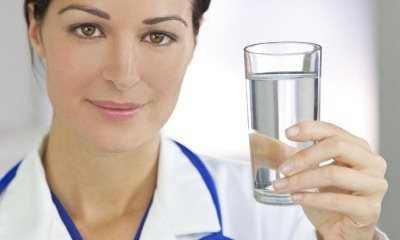
Two liters of water per day is a general average. For calculation, use a formula that takes into account body weight.
A man weighing 80 kg requires 2.4 liters of water per day. A girl weighing 55 kg needs only 1.65 liters of water per day.
If they play sports or work physically, then their daily dose will increase.
Exceeding dosages will cause sodium ions to be washed out of the body. This will lead to nausea, weakness, headaches, and a general deterioration in the body's condition. In severe cases, cerebral edema develops.
Patients with various kidney and heart diseases and pregnant women should use H2O with caution. The drinking regime in this case is developed by the doctor. Violation of its recommendations increases the risk of complications.





